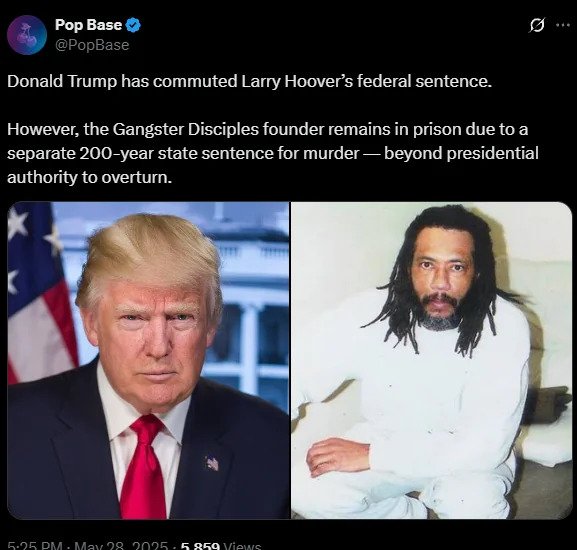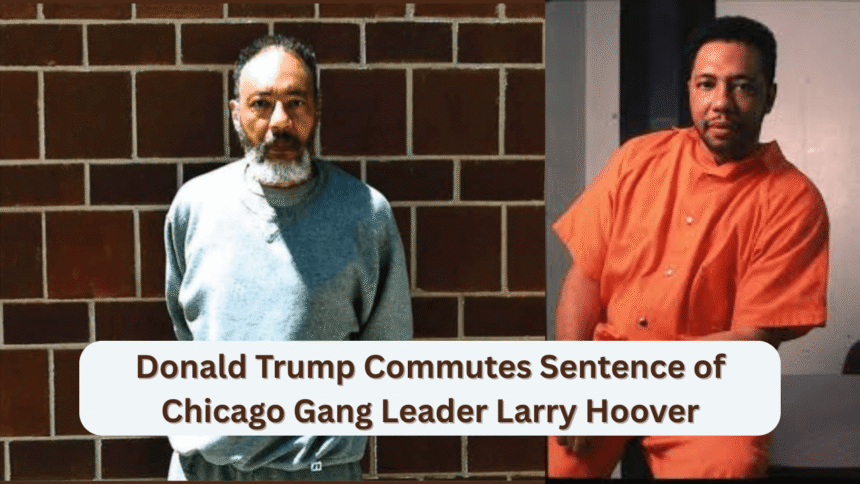The name Larry Hoover has sparked strong opinions for decades—seen by some as a feared gang leader, and by others as a man who has evolved behind bars. Now, he’s back in the national spotlight after former President Donald Trump commuted his federal prison sentence. This decision has ignited fresh debate over justice, rehabilitation, and political motivations.
Larry Hoover’s story isn’t just about crime; it’s also about power, influence, and what true redemption looks like. As news broke about Trump’s clemency, reactions poured in from Chicago to Washington, D.C., proving once again that Larry Hoover remains one of the most talked-about figures in criminal justice history.
Who Is Larry Hoover? A Deeper Look Into His Life and Influence
Larry Hoover was born on November 30, 1950, in Jackson, Mississippi, before moving to Chicago at a young age. He is widely known as the founder of the Gangster Disciples, one of the most influential and feared street gangs in the United States. In his early twenties, Hoover had already gained a reputation for being highly organized and strategic, using this talent to build a criminal empire in Chicago.
Hoover was arrested in 1973 and sentenced to 150 to 200 years for ordering the murder of a drug dealer. Though he was imprisoned at Stateville Correctional Center in Illinois, authorities alleged that he continued to run the gang from inside the prison. Over time, Larry Hoover started to present himself as a reformed man, pushing for education, peace, and community-building programs. His supporters argue that he had genuinely transformed, while law enforcement remained skeptical.
His influence went beyond prison walls, not just within the Gangster Disciples but also in communities where gang culture was prevalent. Some credited him for attempting to change gang dynamics and encouraging members to pursue education and political engagement. However, many critics argued that this was a public relations tactic to reduce his sentence.
What Did Trump’s Commutation Actually Change?
Trump’s decision to commute Hoover’s federal sentence has stirred both praise and criticism. A commutation reduces a sentence but doesn’t erase the conviction. That means Hoover is still technically a convicted felon, and his release isn’t guaranteed just yet—especially since he is also serving state time for the same crimes.

The commutation primarily affects the life sentence Hoover received in federal court in 1997 for charges related to drug conspiracy, extortion, and continued criminal enterprise. His legal team and advocates have long fought to bring attention to the unfairness of multiple life sentences and what they see as a harsh penalty for a man who has expressed deep remorse and demonstrated leadership behind bars.
Public Reaction and Political Implications
Reactions have been mixed. Supporters of prison reform applauded the move, saying that people like Larry Hoover deserve second chances, especially after serving decades behind bars. Some hip-hop artists and activists, including Kanye West and Drake, have also shown public support, further bringing his name into mainstream discussions.
On the other hand, law enforcement agencies and victims’ rights groups were quick to criticize the decision. They argue that Hoover’s gang has been responsible for untold violence and destruction across Chicago and other urban areas. For them, this commutation sends the wrong message about accountability.
Interestingly, Trump’s decision also sparked discussions about the political motivation behind such moves. Was it an effort to gain favor with communities affected by mass incarceration? Or was it influenced by high-profile celebrities pushing for justice reform? Either way, the move has reignited interest in clemency powers and how they are used.
What Happens Next?
Even with a federal sentence commuted, Hoover’s future remains uncertain. He still faces state convictions that must be addressed before any release is possible. His legal team is now focusing on appealing those charges, arguing that his continued imprisonment serves no constructive purpose.
This means that while the commutation is a major legal victory, it doesn’t necessarily translate into freedom. However, it has opened the door for further legal challenges and perhaps, eventually, a real shot at rejoining society.
How Larry Hoover Became a Symbol in the Criminal Justice Debate
Larry Hoover’s story touches on so many layers—crime, punishment, change, and the human capacity for growth. Over the years, he has become more than just a gang leader in the eyes of some. For reform advocates, he’s a powerful example of how rehabilitation is possible even for those who once committed serious offenses.
There are, however, valid concerns about glorifying someone with such a controversial past. The key question many ask is: can someone truly change after decades in prison? For his advocates, the answer is yes. They point to Hoover’s educational initiatives behind bars, his disavowal of violence, and his appeals for peace in inner cities.
Critics argue otherwise, saying that these efforts are merely attempts to manipulate the system. Still, his case remains a prime example of how the justice system wrestles with issues of redemption and retribution.
Why the Larry Hoover Case Matters Today
The debate around Larry Hoover isn’t just about one man. It’s a reflection of broader questions about the American justice system—its flaws, its strengths, and its potential for evolution. Thousands of inmates across the country are serving long sentences for non-violent crimes or have shown evidence of rehabilitation, but lack the support or attention needed to seek clemency.
Hoover’s case has become a flashpoint in these discussions. Whether you believe he deserves freedom or not, the fact that his name has returned to the headlines is pushing people to reexamine their views on incarceration, forgiveness, and reform.
The Complicated Legacy of Larry Hoover
Larry Hoover’s story is far from over. As legal teams fight for his release and activists continue to speak out, the public will be watching closely. His journey from feared gang leader to potential symbol of reform is both controversial and compelling.
What’s certain is that Hoover’s name will remain a part of America’s ongoing conversation about justice. The recent commutation of his sentence by Donald Trump has reignited interest not just in Hoover’s future, but in the future of criminal justice itself.
Whether you see him as a reformed man or a dangerous figure, one thing is clear: Larry Hoover is once again at the center of a national conversation, and his story continues to shape the debate on crime, punishment, and the possibility of change.
Also, read about Bree Purganan.

